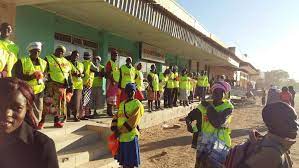In the bustling heart of Harare, with towering skyscrapers and vendors hawking wares amid the honking symphony of traffic, a unique brand of entrepreneurship thrives.
Young Mozambican men, their weathered faces etched with determination, navigate the city’s dirty streets, with backpacks laden with brightly coloured sweets and stacks of mobile airtime vouchers.
They are popularly known as mano, which means a boy in Mozambican language.
Driven by the stark economic realities of their homeland, where limited opportunities and civil war cast long shadows, these Mozambicans cross the border in search of a better life.
The informal economy of Harare, bustling with activity and less stringent than formal channels, offers a lifeline.
They become the city’s airtime angels, their pockets brimming with vouchers often more convenient than official channels.
Their journey begins across the border, in Mozambique’s sun-drenched provinces.
With few opportunities and a currency in freefall, many young men like 22-year-old Gabriel see Zimbabwe as a land of relative prosperity.
“Back home, there’s nothing,” he confides, his eyes glinting with determination.
“Here, I can send money home, build a future.”
Their days are a relentless hustle.
But life on the streets is not without its challenges.
Police crackdowns are a constant threat, and competition from Zimbabwean vendors can be fierce.
The spectre of undocumented status looms large, a constant threat of apprehension and deportation.
Navigating the city’s underbelly comes with its own set of perils — exploitation by unscrupulous middlemen, harassment by officials, and the ever-present risk of losing their wares and meagre earnings.
“Some of the police and municipal police take advantage of us because they know that we have no proper immigration documents.” 21-year-old Ricardo said.
“They sometimes take our stuff. It’s not easy. The competition, sometimes people don’t trust us. But we have to keep going. We have families depending on us.”
The language barrier is a minor hurdle as most of them come from Manica province where a certain version of the Shona dialect is spoken.
Their clientele is diverse: weary taxi drivers seeking a quick top-up, office workers grabbing an afternoon pick-me-up, and students squeezing out the last megabytes of data before their bundles expire.
“Their airtime is convenient as they walk around, and their candies brighten my day,” said Tariro Nyatanga, a young office worker in Graniteside Industrial Area clutching a bag of tamarind sweets.
“They add a bit of vibrancy to the city.”
But Nyatanga also acknowledged the flip side. “It’s tough for them,” she admits, her smile fading.
“They are always looking over their shoulders, worried about getting caught.”
The economic and political turmoil that plagues Mozambique pushes many like Gabriel and Ricardo across the border, seeking a chance at a better life yet they face an uphill battle, navigating the complexities of undocumented status, cultural barriers, and the constant fear of deportation.
As the sun dips below the horizon, casting long shadows across Harare’s sprawling avenues, Gabriel and his compatriots retreat to their lodgings in Mbare, a stark contrast to the city’s glittering facade.
Here, in the labyrinthine alleys and crumbling buildings, desperation clings to the air like the acrid tang of wood smoke.
Their home is a single room in a shared compound; its concrete walls adorned with peeling paint and cracked plaster.
The thin mattress on the floor offers scant comfort, and the single, bare bulb casts an unforgiving light on the meagre possessions scattered around — a dented cooking pot, a pile of threadbare clothes, and a dog-eared Portuguese phrasebook.
The communal kitchen, a dimly lit alcove choked with soot and the cloying smell of overcooked rice, is a shared battleground for the compound’s residents.
Source Bulawayo24









